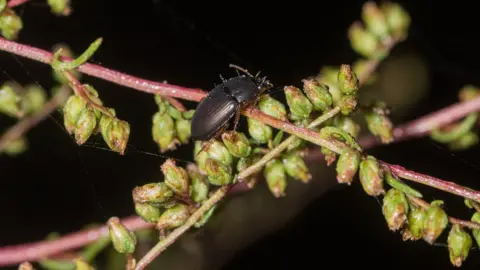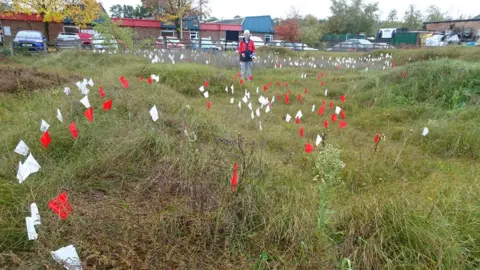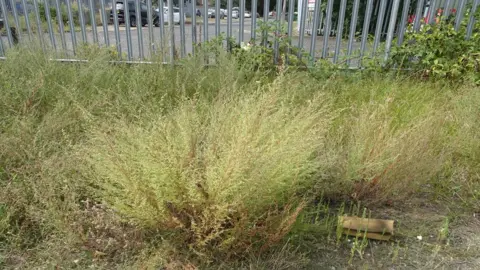Rare wild plant flourishes in Suffolk car park 'nature reserve'
 Brian Eversham
Brian EvershamOne of the country's rarest and most threatened wild plants has "astounded" conservationists by thriving on an industrial-estate nature reserve.
The field wormwood plants grow on one of the tiniest reserves in England in Brandon, Suffolk.
Botanists and volunteers of the group Plantlife said the number of flowering plants had rocketed from two in 2019, to 85 at the latest count.
Plantlife said traffic at the site kept hungry deer and rabbits away.
 Jo Wood
Jo WoodThe nature reserve - a 1,000 sq m (10,760ft) biological Site of Special Scientific Interest (SSSI) in the middle of an industrial estate - has the largest known population in Britain of field wormwood (Artemisia Campestris).
To save the field wormwood, conservationists from the Back from the Brink Shifting Sands project removed turf and vegetation to create bare, disturbed ground the plants require.
The plants are thought to have survived due to the soil being regularly disturbed, and have been monitored closely by the Breckland Flora Group, volunteer botanists co-ordinated by Plantlife.
Johanna Jones, a member of the groups, said the London Road Industrial Estate was "an incredibly special place for plant life".
"In just a year there has been such an increase in the number of flowering plants both in the reserve and the verges and of the beetles that feed on them," she said.
The site's infertile sandy soil means more competitive plants which thrive on enriched soils, such as docks and nettles, are unable to get a foothold.
 Jo Jones
Jo JonesThe verges are now being cut just once a year to give the rare plants a chance to flower and seed.
Already 150 more plants have been counted on verges compared with last year, conservationists said.
Allowing the plants to seed has enabled the survival of the extremely rare Wormwood moonshiner beetle, which eats the seeds.
Dr Peter Stroh, of the Botanical Society of Britain and Ireland, said the nationally rare species exists in very small numbers in three native sites, all in a small area on the Norfolk-Suffolk border centred around Brandon, Lakenheath and Thetford.
"To hear of increasing numbers is brilliant news," he said.

Find BBC News: East of England on Facebook, Instagram and Twitter. If you have a story suggestion email [email protected]
